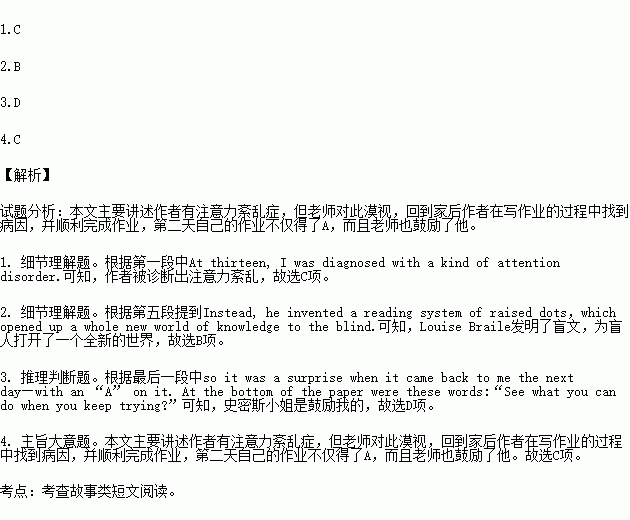题目内容
阅读理解。
At thirteen, I was diagnosed(诊所) with kind of attention disorder. It made school difficult for me. When everyone else in the class was focusing on tasks, I could not.
In my first literature class, Mrs. Smith asked us to read a story and then write on it, all within 45 minutes. I raised my hand right away and said,“Mrs.Smith, you see, the doctor said I have attention problems. I might not be able to do it.”
She glanced down at me through her glasses, “you are no different from your classmates, young man.”
I tried, but I didn’t finish the reading when the bell rang. I had to take it home.
In the quietness of my bedroom, the story suddenly all became clear to me. It was about a blind person, Louis Braille. He lived in a time when the blind couldn’t get much education. But Louis didn’t give up. Instead, he invented a reading system of raised dots(点), which opened up a whole new world of knowledge to the blind.
Wasn’t I the “blind” in my class, being made to learn like the “sighted” students? My thoughts spilled out and my pen started to dance. I completed the task within 40 minutes. Indeed, I was no different from others; Ijust needed a quieter place. If Louis could find his way out of his problems, why should I ever give up?
I didn’t expect anything when I handled in my paper to Mrs.Smith, so it was quite a surprise when it came back to me the next day—with an“A” on it. At the bottom of the paper were these words:“See what you can do when you keep trying?”
1.The author didn’t finish the reading in class because ________.
A. He was new to the class.
B. He was tried of literature.
C. He had an attention disorder.
D. He wanted to take the task home.
2.What do we know about Louis Braille from the passage?
A. He had good sight. B. He made a great invention.
C. He gave up reading. D. He learned a lot from school.
3.What was Mrs. Smith’s attitude to the author at the end of the story?
A. Angry. B. Impatient.
C. Sympathetic. D. Encouraging.
4.What is the main idea of the passage?
A. The disabled should be treated with respect.
B. A teacher can open up a new world to students.
C. One can find his way out of difficulties with efforts.
D. Everyone needs a hand when faced with challenges.

